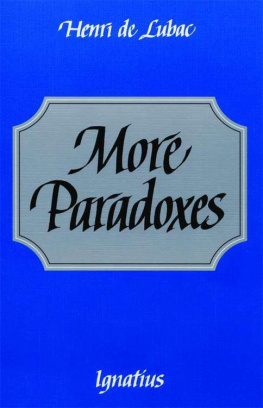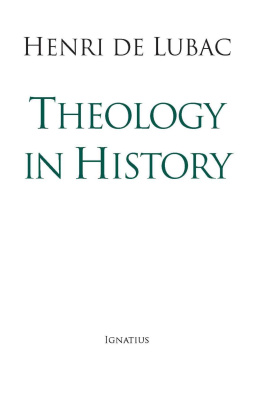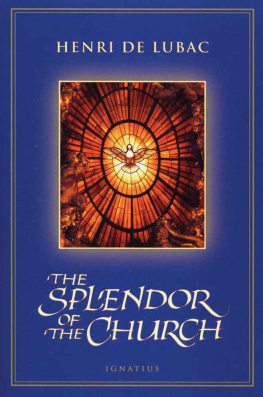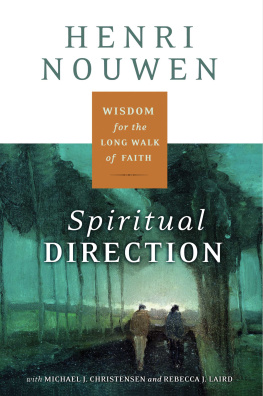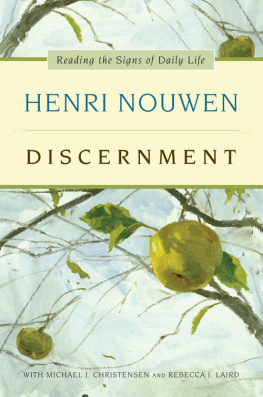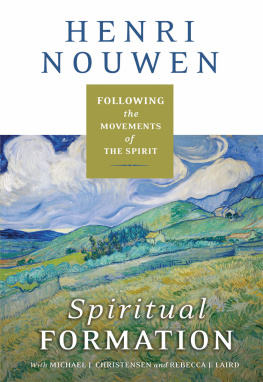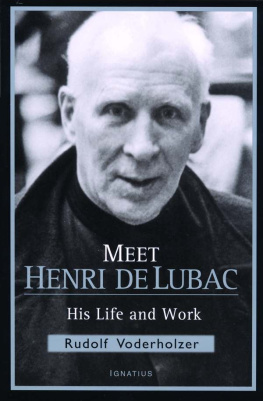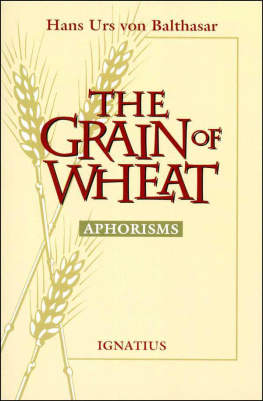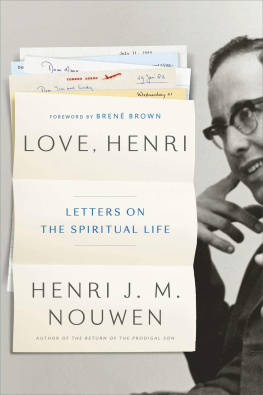MORE PARADOXES
HENRI DE LUBAC
MORE PARADOXES
Translated by
Anne Englund Nash
IGNATIUS PRESS SAN FRANCISCO
Title of the French original:
Autres paradoxes
1994 Culture et vrit, Namur
Cover calligraphy by Victoria Hoke Lane
Cover design by Roxanne Mei Lum
2002 Ignatius Press, San Francisco
All rights reserved
ISBN 0-89870-864-8
Library of Congress Control Number 2001095549
Printed in the United States of America
Contents
Foreword
In his free time in Lyons, Fumet dreamed too of creating in Paris a series, and even a publishing house, in the wake of Temps prsent . He snatched Paradoxes (1946) from me, most of which dates from before the war; this was the first, I believe, of his series of Cailloux blancs. An excellent writer and shrewd critic, Fumet was the least commercial of men. It took no time at all, of course, for his house to go bankrupt. After various transfers, my little book ended by falling into the basement of Editions du Seuil, from which it had some trouble getting out. Yet there was a subsequent Nouveaux Paradoxes , then an edition that joined these two works into a single, somewhat augmented volume.
That is the end of the rather eventful history of Paradoxes . In 1989, in his office on rue de Grenelle, Cardinal Henri de Lubac put in my hands a packet of typed pages, organized by subject, with the words Do what you want with it. It was the manuscript we are now publishing. Then, among the papers left in his room at the Little Sisters of the Poor on avenue de Breteuil, I found a packet of mostly manuscript notes, already divided into four parts and a bit more numerous than those in the first packet Father de Lubac had delivered: it was a draft of this manuscript. It bore the title Other Paradoxes ; similarly, the first two parts were entitled, respectively, Gospel and Council. Collegiality. Para-and Post-Council. We have kept these titles; those of the last two parts were supplied by the publisher.
These Paradoxes were written between the end of the Council (1965) and at the earliest 1983, the latest attested date.
Moreover, in the hands of our author, paradox seeks to free events or thoughts from their circumstantial clothing and to show the life of the spirit in them, whether it be welcomed or disputed. Instead of dozing off in the world of appearances or falling asleep in the emptiness of non-being, paradox helps the spirit awaken to the reality of things, which is its realm, and names the lie.
Father de Lubac had already trained himself in this particular form of exercise in his Paradoxes and New Paradoxes . It would have been regrettable not to have made these Other Paradoxes available to the public. They attest to our authors unceasing activity and form what is undoubtedly the most personal part of his work. In addition, the reader will find in them the clarity, magnificent language, spiritual understanding, and shrewd discernment of Henri de Lubac.
For all these reasons, which its board of directors has deemed judicious, and also encouraged by friends of Father de Lubac, Culture et Verite is publishing these Other Paradoxes . In doing so, all that was needed was a final revision: verifying references and quotations, eliminating a few repetitions, shifting one or two paradoxes for the sake of the beauty of the form, and, rarely, dropping a passage in the interests of discretion. My warm thanks go to my colleagues Fathers Jean-Marie Hennaux, Marc Leclerc, Louis Renard, and Henri Tihon for their work on this.
George Chantraine, S.J.
Rector of the Theology Faculty
Lugano
I
Gospel
This is hardly a paradox: The unsophisticated reader of the Gospels, unfamiliar with the details of the historical, social, political, and religious circumstances of the little Jewish, Galilean world in which Jesus lived, is perhaps in a better position to understand the heart of the Gospel than many a scholarly specialist. The latter, even if he is a believer, often has great difficulty seeing in what way precisely the message of Jesus, wholly rooted as it is in this particular locality, is of a supreme universality.

The divine simplicity of the Gospel is a divine complexity, like that of God himself. Starting from an a priori, a dogmatic or methodological a priori, whether explicit or implicit and at times even unperceived by themselves, many critics are guided by the idea that the person of Jesus does not transcend the limits of a human being conditioned by his surroundings. They are led in that way to select certain traits, and to eliminate others, so as to obtain a credible portrait. As von Balthasar has shown ( The Glory of the Lord , vol. 1: Seeing the Form [San Francisco, New York: Ignatius Press, 1982], pp. 605-6), the result is merely a series of oversimplified outlines, skimpy representations, none of which has anything left but the semblance of a banal personality, and all of which contradict each other. Moreover, despite a desire to work an objective historical reconstruction, these forms often bear characteristics that could have been predicted in advance on the basis of the authors philosophy or mentality and the reconstruction of his period.

Jesus central assertion, the assertion that he is unique, that he is the Son, has no relation to the culture of his time, to the Semitic culture any more than to the Hellenic culture. Scandal for the Jews, folly for the Gentiles. This assertion would have to be refuted as senseless in order to reduce Christianity, however one tries to explain it, to the relativity of a cultural fact, as extensive as one might well admit this fact to be throughout space and time.
Nor do I do see this assertion of Jesus about himself, with all the gravity, all the demands, and all the consequence it entails, ever expressed by another human being at any other point in space or time.

I am prepared to follow, insofar as I am able, in any case with patience and docility, all the analyses, all the critical and philological explanations of our exegetes concerning each of the Gospels and each of their verses, their direct or indirect relationships, the reconstruction of their sources, the alterations of their texts, and so on, and so on. But I would first of all like to assure myself, in the course of a very simple exchange, without any artifice or technical jargon, that they have understood something about the Gospel as we have it in our hands today, in its fourfold form.

I hear talk everywhere about the divergences among the theologies of the authors of the New Testament. As for me, I admire much more their convergence .

There is indeed only one Christ in the New Testament, but there are many Christologies (H. Zahrnt, Dieu ne pent pas mourir , trans. A. Liefooghe [Paris: Cerf, 1971], p. 183). Let us pass over the word many, which is obviously excessive. Without contradicting the author, it would be better to turn his phrase around: There are several Christologies in the New Testament, but there is only one Christ. Still, this adversative but is inadequate, for these various Christologies do not contradict each other: they converge, they unite to give us a glimpse of the one Christ.
What is surprising about the fact that each author had his particular perspective? And how would a single perspective suffice? From the very first generation, Christians have understood this well.

